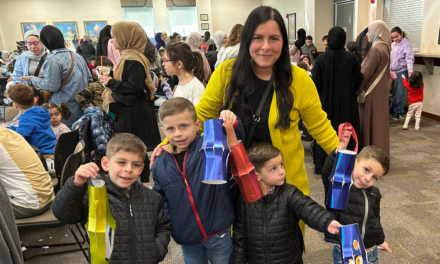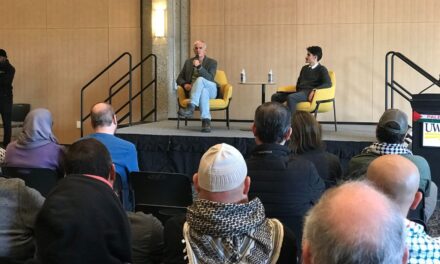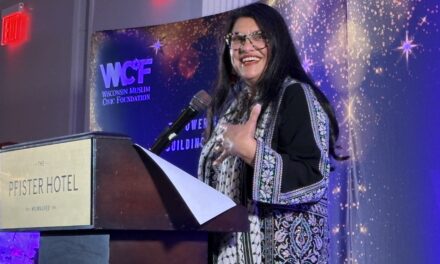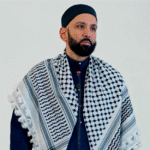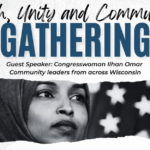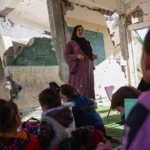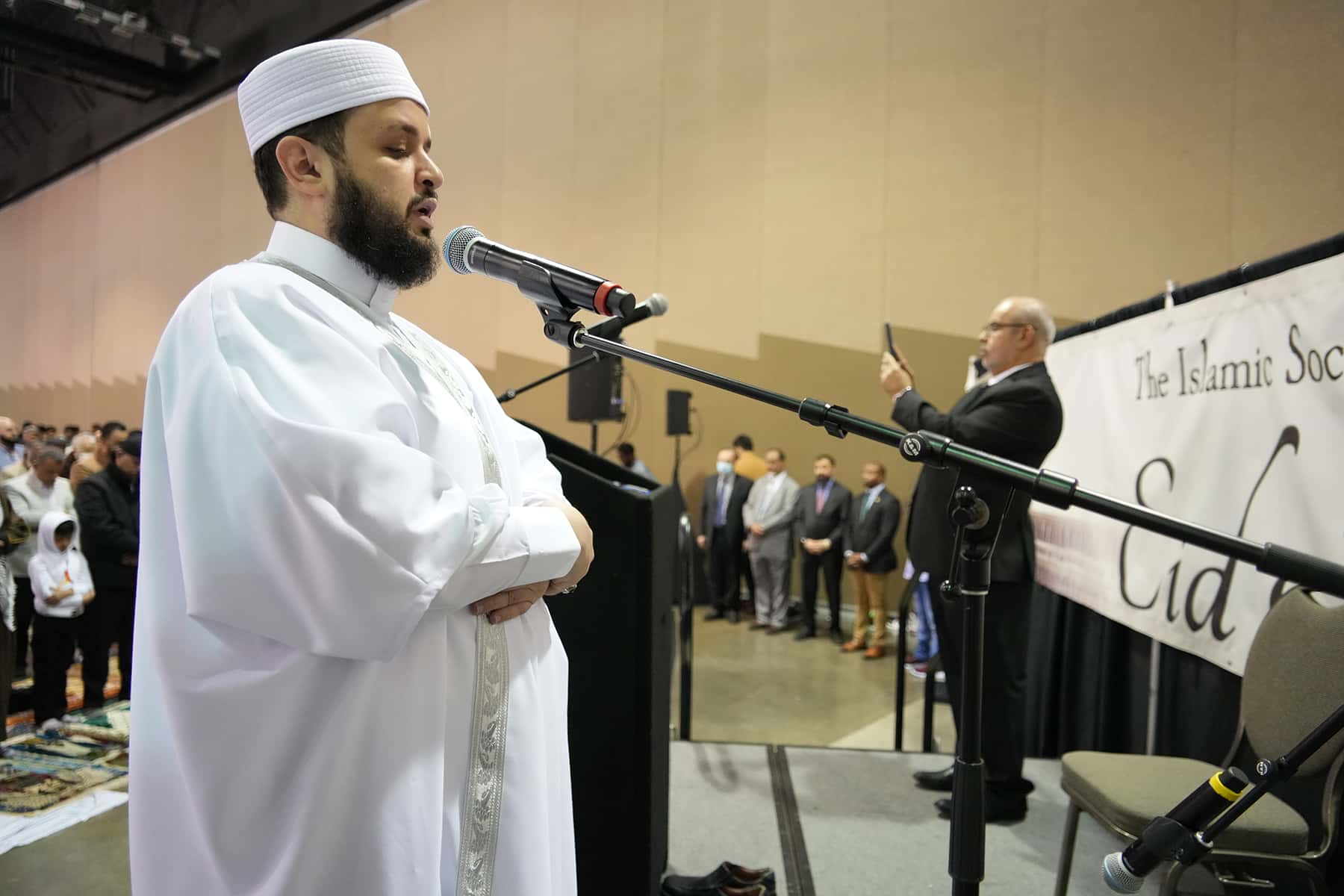
ISM-West imam Rami Bleibel leads the prayer at the 2022 Eid Al-Fitr service in Milwaukee.
When Milwaukee native Rami Bleibel became resident scholar and imam of the Islamic Society of Milwaukee – Brookfield, he also joined the ranks of a new breed of imams in the United States—homegrown.
Of full-time imams nationwide, 22% are American-born, an increase from 15% in 2010, according to research done in 2020 by the Institute of Social Policy and Understanding. American-born imams are seen as critical for connecting with new generations of Muslims who themselves have been born in the U.S., according to a report from the Associated Press.
Wisconsin Muslim Journal sat down with Bleibel, 34, this week to ask him about his American roots and his new role as the leader of a growing, diverse community of Muslims in Greater Milwaukee’s western suburbs.
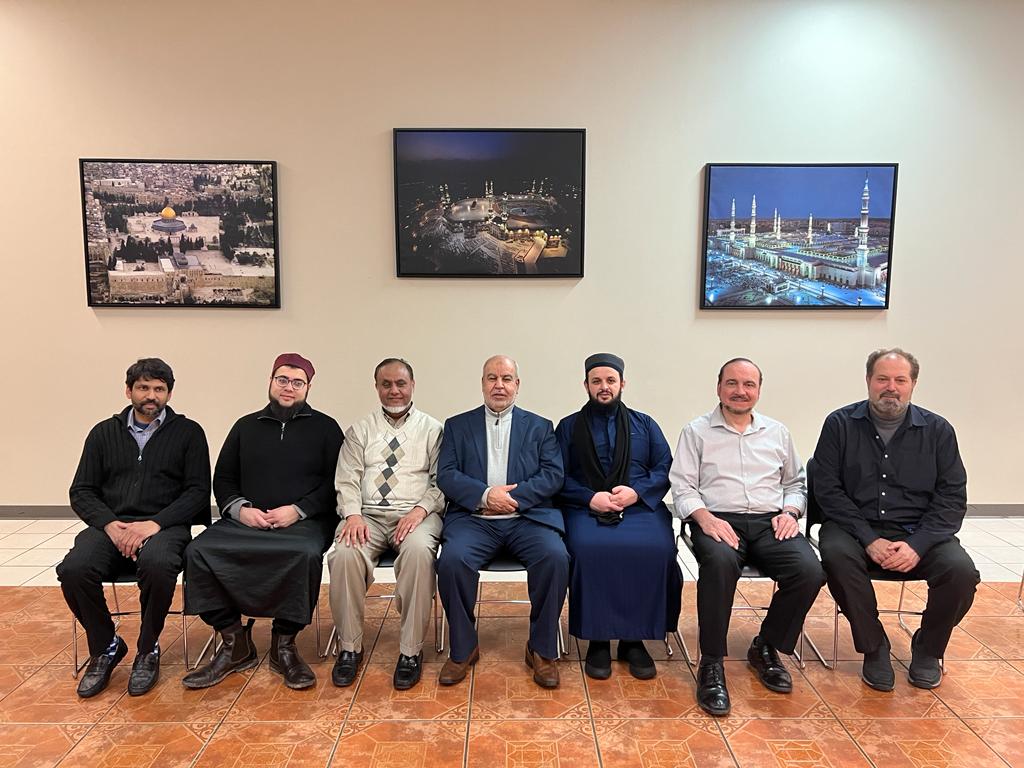
Imam Rami Bleibel (third from right) is one of two young men the Islamic Society of Milwaukee supported through Islamic studies with full scholarships. The other is Ameer Hamza (second from left). Shown with Shura vice president Shaik Sayeed, M.D.; ISM Religious Director Zulfiqar Ali Shah, Ph.D.; Imam Ziad Hamdan, Shura member Waleed Najeeb, M.D. and Shura president Salah Sarsour.
Here are the highlights of our conversation:
Tell us about growing up in Milwaukee’s Muslim community.
I’ve been part of the Islamic Society of Milwaukee as far back as I can remember. I remember being a child, running around the masjid (at ISM—Main, 4707 S. 13th St., Milwaukee). Back then, it didn’t have the large building it has today.
For all of us kids, the prayer hall was the playground. During Ramadan, our parents would go downstairs to the basement to set up a potluck dinner and we’d be upstairs in the prayer hall playing soccer, tag, football, you name it. When it came time for prayer, we’d stay and pray.
My mother, Nabila Dahche, was very active in the ISM and various Muslim organizations in the larger Milwaukee community. So, naturally, I was at the ISM all the time.
Both my parents were Palestinian refugees born in Lebanon. I have four siblings, three brothers and one sister. I’m the oldest.
Did you have a typical American childhood?
In many ways. I went to Milwaukee Public Schools and graduated from Rufus King High School in 2006. I loved sports, primarily soccer. I played on the varsity soccer team at Rufus King and did track and field in the spring. I also wrestled in the winter of my junior and senior years. My life pretty much revolved around sports during high school.
Why did you decide to pursue the religious life?
My story starts with my mother. When I was a senior in high school, she was pushing me to go into Islamic studies. That was very unique, Most Muslim parents were pushing their children to study medicine, engineering or law.
I wasn’t interested at the time but she kept bringing it up. She wanted me to go to Al-Azhar University in Cairo. She told me, ‘Try it. If you don’t like it, you can come back.’

Shaykh Rami Bleibel led a Ramadan lecture series at ISM-Main.
I was already accepted at the University of Wisconsin-Milwaukee but I decided to put my application on hold and take a gap year to Egypt. Why not? In all honesty, I was going for the experience and to please my mom.
That year abroad really changed my perspective. Those few classes I took in Qur’an studies and just being in a totally different society is where my true attachment to my religion and practice took shape.
I came back to UWM and graduated with a degree in communication. But after coming back from Egypt, I became a more devout Muslim and very active in the Muslim community.
I volunteered at the ISM and in conventions, giving talks. I did personal studies. I also did a graduate certificate in Teaching English as a Second Language at UWM.
I ended up working with ISM as a youth director for a few years and teaching Islamic Studies at Salam School. That’s also when I worked with MAS (the Muslim American Society) as executive director for the Milwaukee chapter. I worked with MAS National as the communication and administration coordinator as well. And with American Muslims for Palestine.
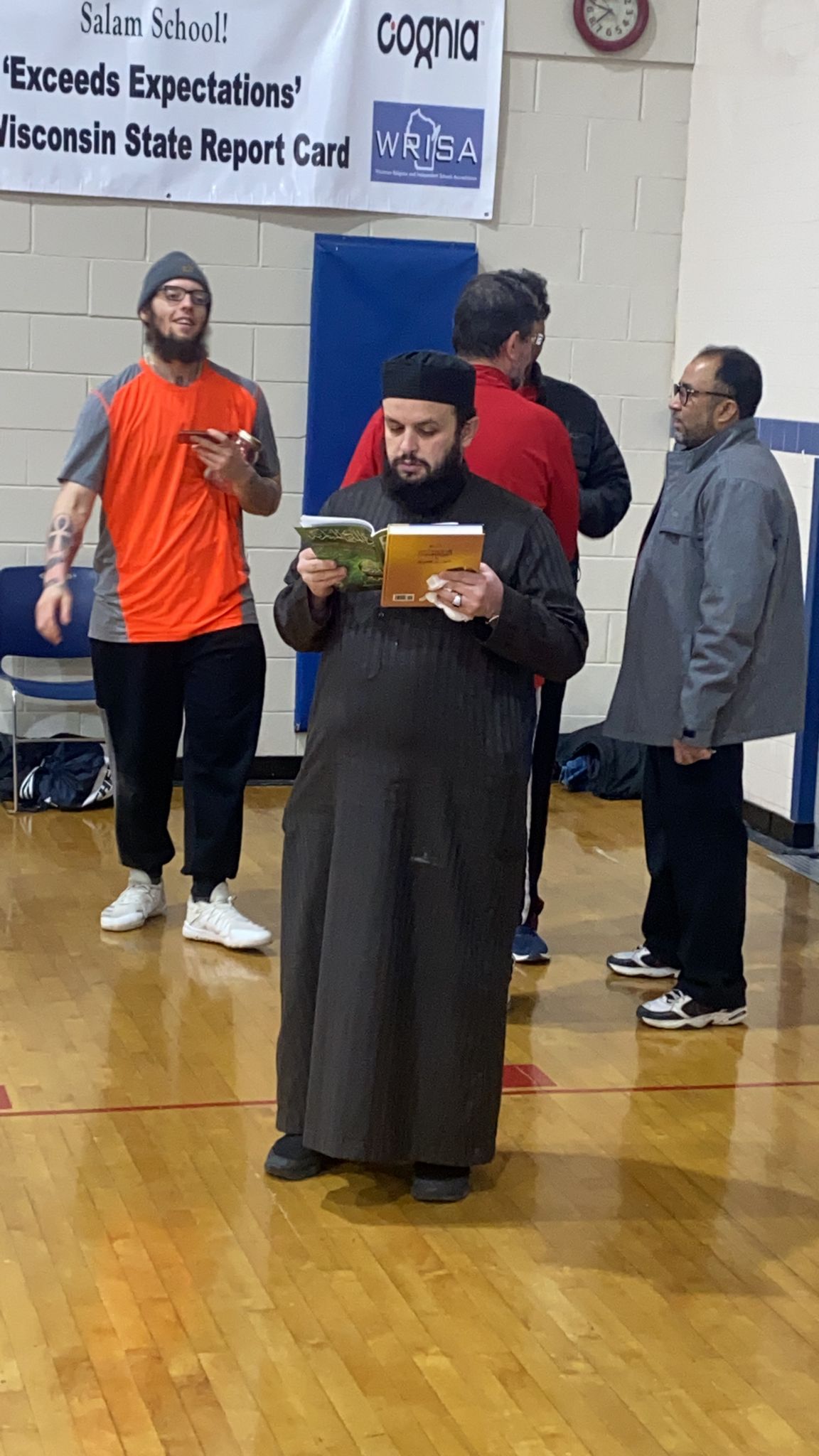
Shayk Rami Bleibel in the gym at Salam High School where he is an instructor of Islamic Studies
Mom tells me I could have saved myself some years if I had taken her advice and pursued Islamic studies from the beginning. But these four or five years in my early twenties, working in our Muslim community, both locally and nationally, gave me some insights and allowed me to approach my studies with more maturity.
ISM provided a scholarship for you to pursue your religious studies. How did that come about?
I was approached by the Shura in 2014 as one of two local people they had identified for this opportunity. It was something I felt comfortable with and wanted to do. I found myself in that position (of preparing for religious life).
Why did the Shura decide to provide scholarships for you and Ameer Hamza?
The Shura’s plan was to invest in local, homegrown, American Muslim scholarship. Until recently, the majority of imams in the U.S. were from the immigrant community. There’s a need across the country for American-born Islamic scholars.
Second and third-generation American-born Muslims need imams who can relate to American culture. Growing up here, I went through the challenges Muslim American youth go through in middle school and high school. Having that understanding is crucial to helping Muslim American youth shape their identity and be confident in their religion.
Immigrant scholars, with all the benefit they bring, will always have some gap in cultural understanding with American youth. In a community like Brookfield, where we don’t have a full-time Islamic school, the majority of youth go into the public school system. Most parents want their children to maintain their Islamic identity. With all the pressures they face, that’s difficult. It is important for them to have someone they can relate to for spiritual guidance.
Where did you go for your Islamic studies?
My Islamic studies were primarily in Lebanon at Jinan University. They have a full Islamic Studies Department with different specializations. I studied Islamic Law there from 2015 – 2021. I also spent some time studying in Turkey, Morocco and other parts of the world.
How did this opportunity to pursue Islamic studies abroad impact you?
Leaving my comfort zone had a big impact on my outlook on life and the world in general. Living in Lebanon, especially in the last two years, with all the challenges and difficulties, is not like living in the States. To not always have electricity or water puts our luxuries in perspective.
Spending time in other countries has helped me to be more open-minded and to understand different perspectives. The way I view something is not the way somebody in Morocco or Turkey will see it. Being exposed to that during my studies allows me to have a broader outlook and more understanding.
Please tell us about your family.
I am married. My wife, Yassmin Kassem, and I will celebrate our 10th anniversary in January. We have three children: Maryam, 8; Zayd, 3; and Ibraheem, 1. They keep us super busy.
You’ve been the imam at Masjid Al-Noor for a few months now. What do you enjoy about the job?
I really enjoy interacting with the people, especially when I find I’ve given some benefit to somebody—the simple things like consoling someone in the community who has lost a loved one or being there for someone’s happiest occasion, a wedding or celebration. Or when someone says, ‘That sentence you said in the khutbah meant a lot to me.’
I appreciate the opportunity to build relationships with people from all different backgrounds, when special bonds develop.
What do you not enjoy?
Well, I signed up for it, but it is really a 24/7 job. It is very demanding. I may get a call or text at any time that needs attention. It’s tough when my kids want to spend time with me but I have to go because something just happened. That, for me personally, is the toughest part of the job.
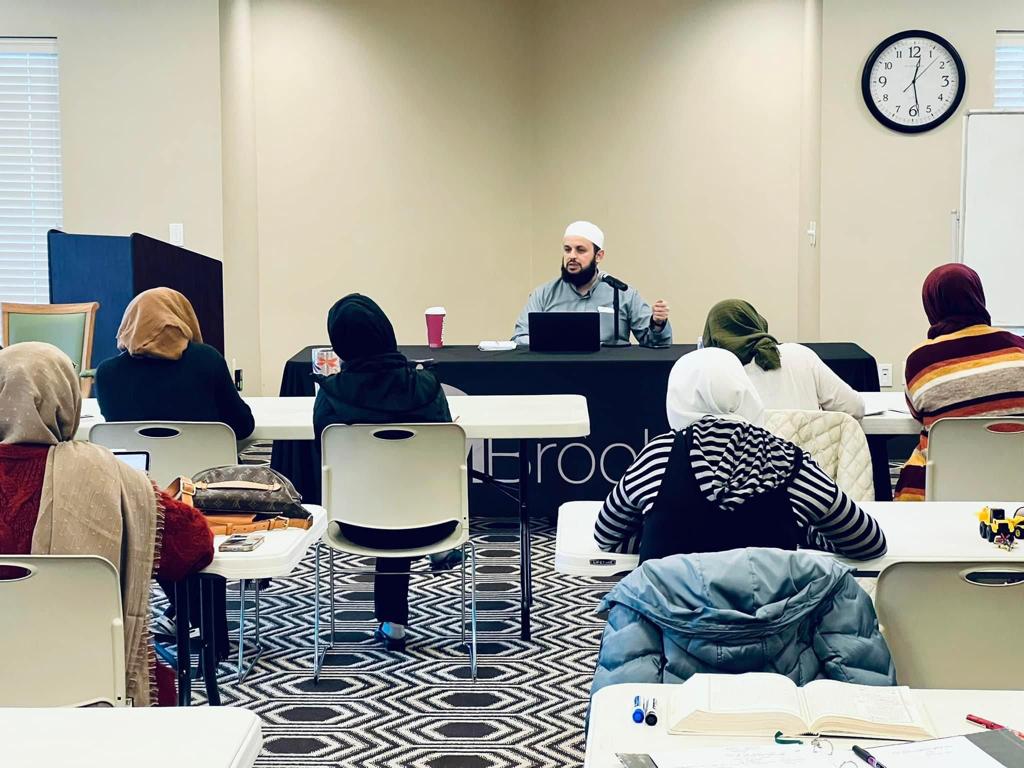
Who has influenced you?
So many people from ISM. Definitely my mother. Also, my teachers abroad highly influenced my perspective and character.
The current president of ISM, Br. Salah Sarsour has had a profound influence on me, the way he is very devout to the community and very active. Whenever I get tired, I think of his energy, passion and sincerity in serving the community and it motivates me.
Shayk Ziad Hamdan has always been—as far back as I can remember—and continues to be a mentor.
And now, since I’ve returned from my studies, I’ve built a good relationship with Dr. Zulfiqar Shah. I lean on his expertise.
How do you feel about being an imam?
It is a heavy responsibility.
I always remind myself we’re an extension of the prophetic mission of teaching people about the religion and law. In order to fulfill this duty, I must follow the footsteps of prophets. It’s not just about the teaching but about having the compassion, the energy, the love, the time to really invest in people. It is not something I take lightly.
My role is to bring out the best of people and to benefit people spiritually, intellectually and so on—to bring them closer to God. I truly believe that Islam is a gem. Our tradition has so much history and wisdom in it and we are just scratching the surface.
ISM-West is very culturally diverse. Does that pose any challenges?
Being second-generation, American-born, I have been raised in a diverse, pluralistic society. I didn’t grow up in a certain bubble.
And when I was young and we went to ISM-Main on Milwaukee’s Southside, people attended from all over Greater Milwaukee. It was very diverse, with people from all different cultures and nationalities.
I’m very comfortable with the diversity in our community. I feel very comfortable at ISM-West. I feel at home.
My hope is to make the masjid a home for every community member, regardless of their level of religiosity or practice, regardless of what they are going through in life. I want to make it a place everyone can come to and feel comfortable, and know they are at home.
